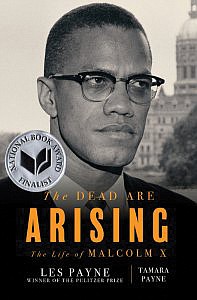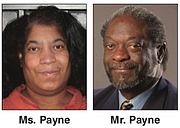Malcolm X bio wins National Book Award
Free Press wire reports | 11/25/2020, 6 p.m.
NEW YORK - Tamara Payne and her late father Les Payne’s Malcolm X biography, “The Dead Are Arising,” has won the National Book Award for nonfiction.
Charles Yu’s “Interior Chinatown,” a satirical, cinematic novel written in the form of a screenplay, was cited for fiction and Kacen Callender’s “King and the Dragonflies” for young people’s literature.
The poetry prize went to Don Mee Choi’s “DMZ Colony” and the winner for best trans- lated work was Yu Miri’s “Tokyo Ueno Station,” translated from Japanese by Morgan Giles.
Honorary medals were given Nov. 18 to mystery novelist Walter Mosley and to the late chief executive officer of Simon & Schuster, Carolyn Reidy, who died in May at age 71.
The award for “The Dead Are Arising” is the second time in a decade a Malcolm X biography has received a high honor for nonfiction and the second time the honor was, at least in part, posthumous.
Scholar Manning Marable died right before the 2011 publication of “Malcolm X,” which went on to win a Pulitzer Prize and receive a National Book Award nomination. Les Payne, a Pulitzer Prize-winning journalist, died in 2018. His daughter, a researcher, finished the book.
“This is such a bittersweet moment,” Tamara Payne said upon accepting the award at the Nov. 18 ceremony that was streamed online because of the pandemic, with presenters and winners speaking everywhere from New York to Japan. “I really wish my father was here for this.”
Winners in each of the competitive categories receive $10,000.
The children’s author and current U.S. Youth Ambassador for young adult literature Jason Reynolds served as emcee, and along with Bob Woodward and Walter Isaacson was among the Simon & Schuster writers who appeared in a taped tribute to Ms. Reidy.
The traditional dinner ceremony is the nonprofit National Book Foundation’s most im- portant source of income and is usually held at Cipriani Wall Street, where publishers and other officials pay thousands of dollars for tables or individual seats. The foundation instead has been asking for donations of $50 or more. As of Nov. 18, just over $490,000 had been pledged from 851 donors.
“It’s hard in a pandemic. We were scared we wouldn’t be able to do this show,” said foundation executive director Lisa Lucas, speaking online from the children’s room of the Los Angeles Public Library. Executive director since 2016, Ms. Lucas will depart at the end of the year to become publisher for the Penguin Random House imprints Pantheon and Schocken.
Her successor has not been announced.
Along with the pandemic and the presidential election, diversity has been an ongoing theme in the book world this year and remained so at the ceremony, from Ms. Lucas urging publishers to work at transforming a historically white industry to the winners themselves.
Mr. Mosley, the first Black man to win the medal for Distinguished Contribution to American Letters, spoke of his debt to such literary heroes as Ishmael Reed, John Edgar Wideman and Ralph Ellison. Mr. Yu’s novel is a sendup of Chinese stereotypes and of the immigrants’ conflict between wanting to assimilate and asserting their true selves. “DMZ Colony” combines poetry, prose and images in its exploration of the history between the United States and South Korea.
Few references were made to the recent election, though politics did help inspire Mr. Yu, whose previous books include the story collections “Third Class Superhero” and “Sorry Please Thank You.” He had struggled with “Interior Chinatown,” wondering if there was a reason to tell an immigration story, until the surprise presidential victory of Donald Trump in 2016.
“Before then, I felt it lacked a real reason for being,” Mr. Yu told The Associated Press in a recent interview. “It seemed that reference to things in the past like the Chinese Exclusion Act (a racist law passed in 1882) had relevance. I started thinking, ‘This does still matter. This is a story you should try to tell.’ ”







